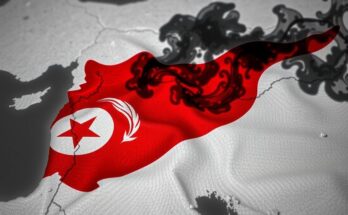Tensions are rising in the Horn of Africa as leaders from Egypt, Somalia, and Eritrea convene to discuss forming a security alliance against Ethiopia amidst ongoing civil war. Significant concerns arise from Ethiopia’s deal with Somaliland, which provides it access to the Red Sea, while Egypt aims to encircle Ethiopia amid fears regarding its military capabilities. This potential alliance raises the specter of Cold War-style proxy conflicts in a region fraught with instability.
Tensions are escalating in the Horn of Africa as a coalition of Egypt, Somalia, and Eritrea explores a collective security alliance potentially targeting Ethiopia. This shift, marked by a significant summit in Asmara on October 10, 2024, raises apprehensions regarding the region’s stability amidst ongoing conflicts. The meeting of leaders Isaias Afwerki of Eritrea, Abdel Fattah al-Sisi of Egypt, and Hassan Sheikh Mohamud of Somalia indicates a formidable diplomatic maneuver that could reshape regional geopolitics. Since August 2024, Egypt has developed a military and intelligence-sharing pact with Somalia and is on track to establish a similar arrangement with Eritrea. This tripartite discourse emerges against the backdrop of Ethiopia’s two-year civil war, which has induced over 600,000 casualties, alongside destabilizing developments in Sudan. Furthermore, a critical point of contention is Ethiopia’s recent agreement with Somaliland, a self-declared independent region within Somalia, ensuring Ethiopia access to the Red Sea via the port of Berbera. This arrangement has drawn ire from Somalia and neighboring countries, further polarizing the region. Egypt perceives Ethiopia’s burgeoning naval capabilities as an existential threat, especially in the context of the contentious Grand Ethiopian Renaissance Dam, which has been a source of longstanding disputes. In the face of the emerging alliance, concerns mount regarding the potential for proxy conflicts reminiscent of Cold War dynamics. Somalia’s internal strife, particularly with the resurgent Al Shabab, complicates the scenario, as the group finds new weapons access routes in light of a U.S. arms embargo. Eritrea, isolated due to sanctions, may see a shifting alignment towards Ethiopia, particularly in addressing the Tigray conflict. This nascent coalition, while a diplomatic victory for Egypt, raises questions about the actual stability it may afford to Somalia and Eritrea. The current diplomatic climate hints at an impending turbulence that could disrupt longstanding trade routes and exacerbate military tensions. These developments necessitate vigilant observation from global actors, given their potential to reverberate beyond the region. As the specifics of this alliance continue to unfold, the implications could either prompt Ethiopia to re-evaluate its operations in Somaliland or incite deeper regional rivalries, heightening the risk of escalating conflicts in an already volatile landscape.
The Horn of Africa, comprising countries such as Ethiopia, Somalia, Eritrea, and Sudan, has historically been a hotspot for geopolitical tensions, influenced by ethnic conflict, territorial disputes, and competition for resources, such as water. As Ethiopia grapples with civil war, regional dynamics are further complicated by the recent recognition of Somaliland, adding fuel to the flames of existing grievances. In this context, the potential alliance of Egypt, Somalia, and Eritrea against Ethiopia could significantly alter traditional power balances, raising global concerns.
In conclusion, the recent diplomatic initiatives among Egypt, Somalia, and Eritrea, centered around a potential alliance against Ethiopia, highlight a critical juncture in the Horn of Africa’s geopolitical landscape. As tensions escalate and old rivalries resurface, the prospect of proxy conflicts looms large, with implications that extend beyond regional borders. This evolving situation calls for heightened international scrutiny and intervention to avert potential crises that could destabilize not only the Horn of Africa but also the broader geopolitical environment.
Original Source: www.orfonline.org




